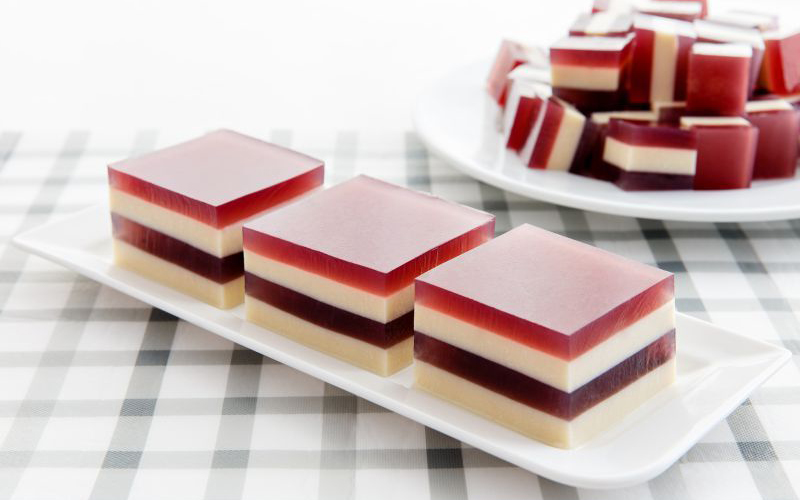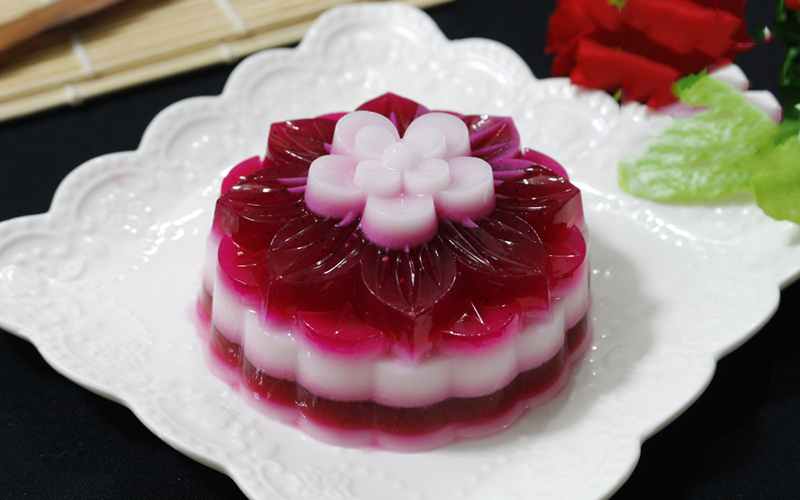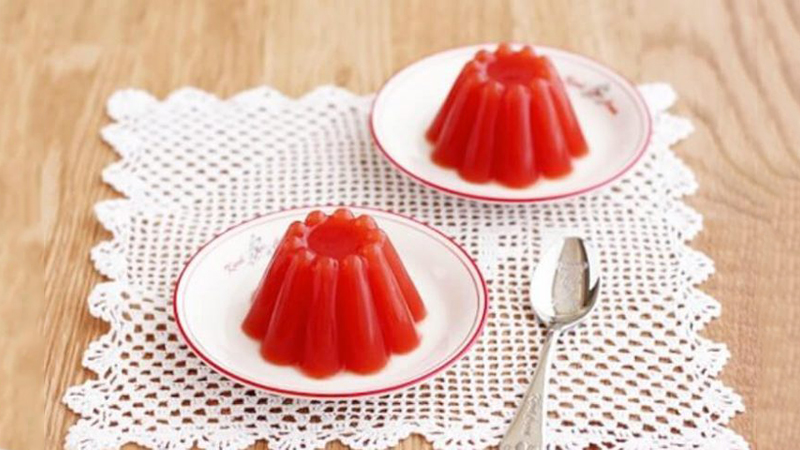Agar, or agar-agar, is a popular delicacy among many due to its nourishing and refreshing qualities. This has led some to wonder about the calorie content of this delicious treat. So, how many calories are there in 100g of agar jelly? And will eating a lot of it make you gain weight?
1. Calories in Agar
Agar powder typically contains approximately 62 calories per 100g. However, when preparing agar jelly, additional ingredients such as water, sugar, and flavorings are added, increasing the calorie count, but usually not exceeding 80 calories per 100g.
 Typically, there are no more than 80 calories in 100g of agar jelly
Typically, there are no more than 80 calories in 100g of agar jelly
There are five distinct varieties of agar jelly, each with a different calorie count:
-
: Approximately 80 calories
-
Sugar-free agar jelly: Very few calories, approximately 28-30 calories
-
Zai Zai agar candy: Approximately 15 calories
-
Coconut agar jelly: Approximately 38 calories
-
Long Hai agar jelly: Approximately 17 calories
2. Nutritional Value of Agar
 Agar is a rich source of over 90 trace minerals from the sea
Agar is a rich source of over 90 trace minerals from the sea
Agar has been scientifically proven to be a rich source of over 90 trace minerals from the sea, including potassium, three times the amount found in milk, twice to three times the vitamin A content of carrots, four times the calcium of milk, and low levels of sodium.
3. Health Benefits of Agar
According to numerous studies published in Medicalnewstoday, agar offers a plethora of health benefits:
Healthy Body Tissues
 Agar can help prevent or repair body tissues
Agar can help prevent or repair body tissues
A 2017 study suggested that a supplement combining agar and casein could help prevent or repair body tissues in athletes. However, the study examined the effects of supplementation rather than dietary intake. A 240g serving of agar jelly provides 0.82g of protein.
The 2015-2020 Dietary Guidelines for Americans recommend that adults consume 46-56g of protein or 10-35% of daily calories, depending on age and gender. Like meat, agar is a good source of protein but without the unhealthy fat.
Skin Care
 Agar can help keep skin youthful and healthy
Agar can help keep skin youthful and healthy
Collagen is known to promote youthful and healthy skin. As we age and lose collagen, our skin becomes less firm, and wrinkles develop. Consuming agar can boost collagen production and improve skin appearance naturally. A 2016 study found that collagen consumption improved facial moisture and reduced wrinkles.
Digestive Support
 Agar is beneficial for digestive health
Agar is beneficial for digestive health
Agar helps food move through the digestive system by binding with water. It also contains glutamic acid, which promotes a healthy mucous membrane in the stomach and aids digestion. Additionally, it stimulates the production of digestive juices.
Joint Pain Relief
 Agar can reduce joint pain and improve joint function
Agar can reduce joint pain and improve joint function
The collagen in agar can reduce joint pain caused by inflammation. According to the National Library of Medicine, some clinical studies indicate that agar can reduce pain and improve joint function in people with osteoarthritis. However, further research is needed.
Blood Sugar Management
 Agar can help manage type 2 diabetes
Agar can help manage type 2 diabetes
A study showed that an amino acid in agar called glycine can help people with type 2 diabetes control their condition. Those who used glycine as a treatment lowered their A1C levels and reduced inflammation.
This suggests that glycine may help prevent complications such as tissue damage. However, some agar products with high sugar content are not suitable for people with type 2 diabetes.
Stronger Bones
 Agar contributes to stronger bones and prevents bone loss
Agar contributes to stronger bones and prevents bone loss
Agar is a food that contains calcium and magnesium and can help the body absorb phosphorus, contributing to stronger bones and preventing bone loss. Some people consume agar to reduce the risk of osteoporosis, a condition that weakens bones.
A 2001 study found no significant difference in bone density between rats that consumed agar and those that consumed another protein source.
However, a 2017 study found that when rats deficient in vitamin D consumed agar, there was a positive effect on bone density. More research is needed to confirm whether eating agar can improve bone health.
Improved Sleep Quality
 Agar can enhance sleep quality
Agar can enhance sleep quality
The glycine in agar can improve sleep quality in some individuals. In a 2006 study, participants who took 3g of glycine before bedtime reported improved sleep quality and felt more refreshed and energetic in the morning.
A year later, another study confirmed these findings and suggested that glycine could act as a sleep enhancer. However, studies do not recommend using agar specifically for improving sleep.
Weight Loss
 Agar can promote weight loss
Agar can promote weight loss
Some scientists have suggested that agar can promote weight loss due to its high protein and low-calorie content. Protein makes people feel fuller, reducing the tendency to overeat.
However, a 2011 study by the University of Cambridge compared the effects of consuming an agar-milk diet to a milk-protein diet and found no significant difference in weight loss between the two groups.
Improved Hair Growth
 Agar may enhance hair growth
Agar may enhance hair growth
Some people use agar with the hope that the lysine it contains will improve hair growth. In 2004, scientists observed a significant increase in hair length in mice fed agar for 10 days. However, this does not guarantee that eating agar will improve hair growth.
Preventing Brittle Nails
 Agar may help prevent brittle nails
Agar may help prevent brittle nails
In the 1950s, several studies suggested that consuming agar could help prevent brittle nails. However, there is currently no evidence to support this claim.
4. Does Eating Agar Cause Weight Gain?
 Whether agar causes weight gain depends on the dosage and how it is consumed
Whether agar causes weight gain depends on the dosage and how it is consumed
Typically, the calorie content of agar jelly is very low, around 40-60 calories per 100g. Additionally, almost 90% of agar jelly is water, and when it enters the stomach, it expands to two to three times its original volume, helping you stay fuller for longer and reducing overall food intake, aiding in weight loss.
While agar does not contain fat, it does contain a certain amount of sugar to provide sweetness. This sugar can be converted into fat and lead to weight gain if you consume excessive amounts of agar jelly. Therefore, whether agar causes weight gain depends on the dosage and how it is consumed.
5. Weight Loss Recipes with Agar
Dragon Fruit Agar Jelly
 Dragon fruit agar jelly
Dragon fruit agar jelly
Dragon fruit can help the body metabolize fat and limit fat accumulation due to its low-calorie content, high fiber content, and other beneficial properties. Therefore, this agar jelly, combined with dragon fruit, not only supports effective weight loss but also offers numerous health benefits for the skin and body.
Tomato Agar Jelly
 Tomato agar jelly
Tomato agar jelly
The vitamins and minerals in tomatoes not only help with skin care and weight management but also control blood sugar levels and reduce cholesterol. Additionally, the combination of tomatoes and agar can accelerate weight loss results.
Grapefruit Agar Jelly
 Grapefruit agar jelly
Grapefruit agar jelly
Grapefruit is high in fiber and vitamins, aiding in better digestion. It is also low in calories and sugar, making it a weight-loss-friendly food. If you want to lose weight, be sure to include grapefruit agar jelly in your diet.
































